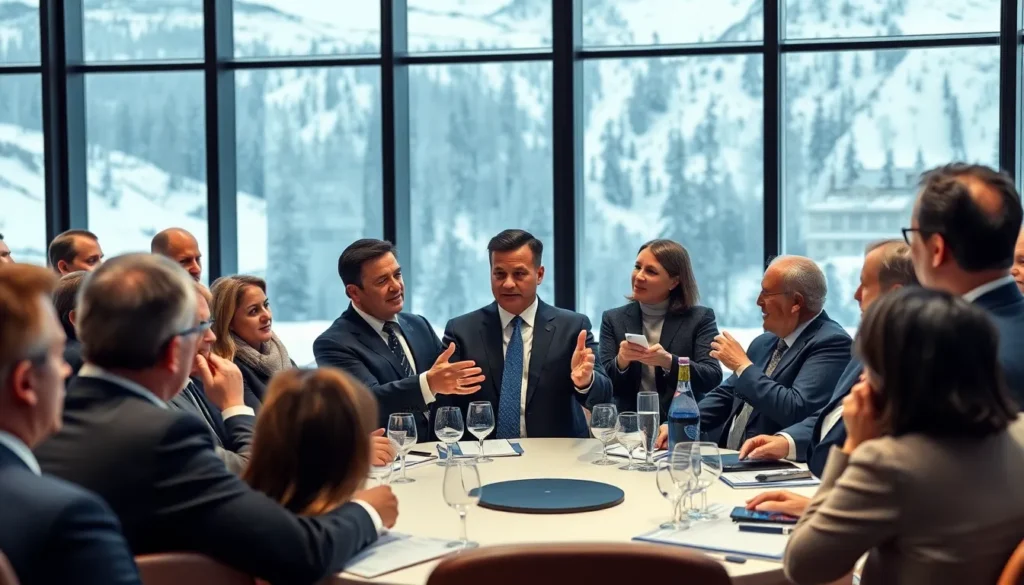Table of Contents
ToggleEvery year, the World Economic Forum (WEF) gathers leaders from various sectors to discuss pressing global challenges and opportunities. This influential platform fosters dialogue among government officials, business executives, and civil society, shaping the future of economies and societies worldwide.
Insights from the WEF provide a unique lens on critical issues like climate change, technological innovation, and economic inequality. By analyzing these discussions, one can uncover trends and strategies that drive global progress. Understanding these insights not only informs decision-making but also empowers individuals and organizations to contribute to a more sustainable future.
Overview of World Economic Forum Insights
World Economic Forum (WEF) insights play a crucial role in shaping global policies and strategies. These insights derive from annual gatherings, where leaders collaboratively address pressing challenges and envision a sustainable future.
Importance of the Forum
The WEF serves as a pivotal platform for fostering dialogue among stakeholders. Collaboration between government officials, business leaders, and civil society enhances mutual understanding and drives innovative solutions. Insights gathered influence economic policies, strengthen international cooperation, and mobilize action towards sustainable development objectives.
Key Areas of Focus
The WEF concentrates on several critical areas, including:
- Climate Change: Discussions aim to devise actionable strategies for reducing carbon emissions and enhancing resilience against environmental impacts.
- Technological Innovation: Emphasis lies on leveraging emerging technologies to foster economic growth and improve social equity.
- Economic Inequality: The forum addresses disparities in wealth and resources, advocating for inclusive economic policies.
- Global Health: Insights focus on improving pandemic preparedness and investing in healthcare infrastructure to ensure universal access.
- Sustainable Development: The WEF promotes frameworks for aligning economic growth with environmental sustainability to support long-term prosperity.
By concentrating on these key areas, the WEF informs stakeholders about urgent global issues and potential paths forward.
Recent Developments in World Economic Forum Insights

Recent discussions at the World Economic Forum (WEF) emphasize the importance of addressing economic trends and sustainability initiatives to foster global collaboration. Current developments reflect actionable insights derived from expert analyses and data-driven strategies.
Economic Trends and Predictions
Economic predictions from the WEF indicate persistent volatility in global markets. Experts project that inflation rates may stabilize, yet geopolitical tensions could disrupt supply chains. Growth rates in emerging markets show signs of resilience, especially in sectors like technology and green energy. According to the latest WEF report, digital transformation contributes significantly to productivity improvements, with companies reporting up to a 25% increase in efficiency when adopting advanced technologies. Emphasis remains on equitable recovery strategies, aiming to bridge the gap between developed and developing nations, ensuring sustainable economic growth.
Sustainability Initiatives
Sustainability initiatives discussed at the WEF highlight a collective effort toward achieving net-zero emissions. Recent commitments by global leaders aim to enhance investment in renewable energy sources, targeting a 50% reduction in carbon emissions by 2030. The WEF outlines that over 100 countries have pledged to implement sustainable policies, focusing on circular economy practices that reduce waste and promote resource efficiency. Innovative partnerships are formed to drive climate finance, with an emphasis on mobilizing over $30 trillion in investments. The forum encourages collaboration between public and private sectors, sharing best practices to accelerate sustainable development and combat climate change.
Impact on Global Policies
Insights from the World Economic Forum (WEF) significantly shape global policies. They facilitate collaboration, promote understanding, and encourage proactive initiatives among nations and sectors.
Collaboration Between Nations
Collaboration between nations forms the backbone of global policy advancements at the WEF. Countries engage in dialogues to address pressing issues like climate change and economic disparity.
- Governments participate in knowledge-sharing sessions to promote best practices.
- Agreements forged during these meetings aim at uniform climate policies and sustainable development goals.
- International partnerships emerge for technological innovation, enhancing cybersecurity and digital infrastructure.
- Collaborative frameworks foster a unified response to global crises like pandemics, ensuring coordinated healthcare access.
Influence on Business Strategies
Influence on business strategies at the WEF helps companies align operations with global objectives. Corporations gain insights that inform long-term planning and innovation.
- Businesses adopt sustainability-oriented practices driven by WEF discussions.
- Investment strategies increasingly focus on green technologies and renewable energy.
- Companies leverage insights on market trends to pivot operations for resilience amid volatility.
- Networking opportunities enable partnerships, leading to innovation in product development and service offerings.
The WEF serves as a critical platform for shaping an interconnected approach to policy and strategic business decisions, leading to a more sustainable and equitable global landscape.
Critiques and Challenges
Critiques of the World Economic Forum (WEF) center around the effectiveness of its insights and the challenge of addressing global inequities. While the forum aims to tackle pressing global issues, the practicality and impact of its recommendations are often questioned.
Effectiveness of Insights
Critics argue that WEF insights sometimes lack actionable strategies for real-world application. Discussions and reports can be overly optimistic, failing to account for the complexities of implementation across diverse political and economic contexts. While trends are identified, their translation into effective policies remains ambiguous. Furthermore, the reliance on corporate sponsorship raises concerns about potential biases in discussions. Ensuring that insights translate into definitive actions requires ongoing accountability from leaders and stakeholders beyond the forum.
Addressing Global Inequities
Addressing global inequities presents a significant challenge for the WEF. Despite calls for inclusive policies, critics point out the continued disparity between wealthy and underprivileged nations. The forum’s discussions may prioritize the perspectives of developed countries, overlooking the voices of marginalized populations. Engaging less affluent nations and communities in these dialogues remains imperative for equitable solutions. Additionally, the transition to sustainable policies, while commendable, sometimes exacerbates existing inequalities, particularly regarding access to technology and resources.
Future Outlook of World Economic Forum Insights
World Economic Forum insights continuously adapt to emerging global dynamics, reflecting evolving priorities and the shifting landscape of international collaboration. The agenda focuses on pressing issues such as climate change, technological advancement, and socio-economic disparities.
Evolving Agenda
The World Economic Forum’s agenda evolves in response to new challenges and opportunities. Leaders engage in discussions surrounding topics such as digital transformation, climate action, and health equity. Emphasizing climate initiatives, the agenda includes commitments to sustainable practices that align with the Paris Agreement targets. Focus on technology encompasses advances in artificial intelligence and blockchain, aiming to enhance economic resilience and accessibility. The WEF also prioritizes inclusivity by integrating diverse voices, particularly from developing nations, to ensure comprehensive solutions that reflect global perspectives.
Potential Areas for Growth
Potential areas for growth identified by the WEF include:
- Sustainable Financing: Increased mobilization of capital toward green projects, with a target of $30 trillion in climate finance.
- Digital Economy: Expansion of digital infrastructure in emerging markets, leading to improved access to technology and resources.
- Circular Economy: Advancements in waste reduction practices that promote resource efficiency and sustainable consumption models.
- Healthcare Innovation: Focus on improving global health systems and pandemic preparedness through partnerships and technology.
- Social Equity: Policies aimed at reducing economic disparity, enhancing access to education, and promoting workforce inclusivity.
By addressing these areas, the World Economic Forum aims to foster a more equitable, sustainable, and prosperous future.
The insights from the World Economic Forum serve as a vital resource for understanding and navigating today’s complex global landscape. By fostering collaboration among diverse stakeholders they pave the way for innovative solutions to pressing challenges. The emphasis on sustainability and economic equity reflects a commitment to a more inclusive future.
As discussions evolve to address emerging trends and urgent issues the WEF continues to be a beacon for policy and strategy development. Engaging all nations in these dialogues remains crucial for achieving equitable solutions. The ongoing efforts to align economic growth with environmental stewardship will shape a prosperous and sustainable world for generations to come.




